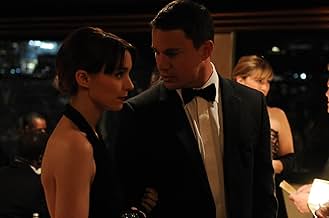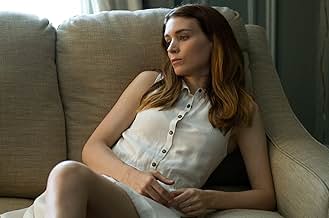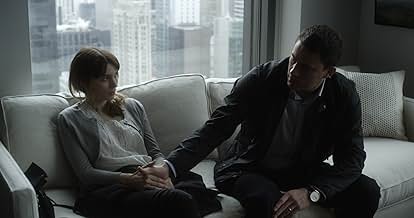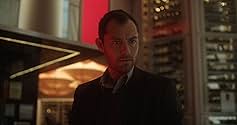El mundo de una mujer joven se desvanece cuando un fármaco recetado por su psiquiatra tiene efectos secundarios inesperados.El mundo de una mujer joven se desvanece cuando un fármaco recetado por su psiquiatra tiene efectos secundarios inesperados.El mundo de una mujer joven se desvanece cuando un fármaco recetado por su psiquiatra tiene efectos secundarios inesperados.
- Dirección
- Guionista
- Elenco
- Premios
- 5 nominaciones en total
- Dirección
- Guionista
- Todo el elenco y el equipo
- Producción, taquilla y más en IMDbPro
Opiniones destacadas
I usually love Steven Soderbergh films. And this one starts off with his usual brilliance and had me hooked for the first half of the film.
The first of the film is well-acted, well-crafted, smart and involving.
Then comes the crunch: without spoiling, the second half of the film is quite different. In a sense the "smart" of the film just becomes an exercise in how "clever" the plot can be at the expense of any emotional truth to the characters. I stopped caring for the ensemble as they started to feel like lifeless pawns following the whims of a "how clever am I?" plot-line. You'll enjoy it if you like a Sunday Afternoon TV Detective movie and like solving the puzzle, but this is not great theatre.
It is better than most films, but only just. Certainly one of Soderbergh's most disappointing. Rooney Mara makes it still watchable - an actress to keep following.
The first of the film is well-acted, well-crafted, smart and involving.
Then comes the crunch: without spoiling, the second half of the film is quite different. In a sense the "smart" of the film just becomes an exercise in how "clever" the plot can be at the expense of any emotional truth to the characters. I stopped caring for the ensemble as they started to feel like lifeless pawns following the whims of a "how clever am I?" plot-line. You'll enjoy it if you like a Sunday Afternoon TV Detective movie and like solving the puzzle, but this is not great theatre.
It is better than most films, but only just. Certainly one of Soderbergh's most disappointing. Rooney Mara makes it still watchable - an actress to keep following.
I saw a couple of interviews with the cast before this film came out and they talked about the fact that this film had a lot of twists and turns in it; and they weren't kidding. However, that being said I went in with a certain mindset and it took me a little time to figure it out, but I eventually did. Either the film was moving real slow for me or I have become accustom to seeing more action. This film is purely psychological in nature, so if you are looking for some action, there isn't any. It also got me to thinking how much power court appointed psychologists have and how they have the power to manipulate the system. On the other hand, it also made me realize that mental patients have absolutely no control over their lives (which may be a good thing). Dr. Jonathan Banks (Jude Law) is the psychologist on the case of a severely depressed patient. His world is quickly turned upside down by having to deal with anxiety, depression, pharmaceuticals and medical ethics. Emily Taylor (Rooney Mara) is the severely depressed woman who is desperately trying to find the right drug to cure her affliction. Dr. Victoria Siebert (Catherine Zeta-Jones) is a former attending psychologist of Emily who is consulted by Dr. Banks to try and uncover some of the dilemmas of her past. Martin Taylor (Channing Tatum) is Emily's husband and is shouldered with the responsibility of trying to care his wife as she tries medication after medication in addition to trying to keep the marriage together. Dierdre Banks (Vinessa Shaw) is Jonathan's wife and she becomes a victim and unwilling participant in the unfolding circumstances that is affecting her life. I think that the entire cast did an excellent job, but as I said before it was a tad slow for me in the beginning. This film definitely keeps you on the edge of your seat and you really do not know who is playing whom. It was difficult to know who to root for until all is revealed at the end. I thought that the story was a good one and it definitely takes you on a roller-coaster ride. I am not sure that anyone could ever reach the level of a Hitchcock film, but this one comes pretty close. Steven Soderbergh did an excellent job embracing this genre of film. I give this film a green light.
Steven Soderbergh has decided to end his career what can only be described as a pharmaceutical, psychosexual thriller that deals with several morally ambiguous characters all revolving around one horrible incident. Out of fear of giving away the intelligent, twist-filled plot written by Scot Z. Burns, that's really all I can say, although I can tell you that Soderbergh directs the film with extreme confidence, and it shows. He was able to convey a sort of quiet chaos with his frequent close-ups, and, by shifting in-and-out of focus throughout the screen, he was able to draw attention to the many small, yet important details.
The real strength of this film, though, is not necessarily the story itself, but how it is presented. To be honest, the story is almost too smart to the point of absurdity, but it never comes off as such. By releasing only one small piece of information at a time, we are kept waiting through interviews, court hearings, false trails, and many psychiatrist visits until, finally, everything comes together into one neat conclusion. The entire film is very subdued, but if you pay attention, you will be rewarded in the end.
Of course, the story would not have turned out so well without the multiple impressive performances that carry it all the way through. Rooney Mara is once again stunning as Emily Taylor, a woman who starts taking prescription antidepressants to cope with her husband's release from prison. Without giving much away, Emily is far more complex than she first appears, and Mara plays this perfectly by retaining a dark mysteriousness about her. She truly steals every scene she's in, and displays such a range of emotions that, at times, it's difficult to tell what her character is truly thinking. This is unfortunate for Channing Tatum, who does a fine job as her loving and sympathetic husband trying to make everything right after being released for insider trading, but who doesn't have close to enough material to compete with Mara.
Jude Law, on the other hand, is arguably the most central figure as Dr. Jonathan Banks, Emily's psychiatrist who is thrown into a scandal when his patient is involved in a tragic accident after taking an antidepressant he prescribed for her. He slowly mentally unravels as his decisions come back to haunt him, and eventually has to cross several moral boundaries in order to get his life back on track. Law shows this frustration with expert skill, and gives one of the best performances of his recent career. The same can be said for Catherine Zeta- Jones, who—as Emily's former psychiatrist Dr. Victoria Siebert—gives possibly the most complex performance, and does it brilliantly despite her lack of screen time.
To give away any more would be to say too much, as the film is so perfectly structured, it is difficult to discuss without giving away the whole thing. All I can add is, it is not so simple and straightforward as it may appear. It is a complex of characters, their motives, and the consequences of their actions, and, despite taking a while to get started, it is truly a spectacular, thrilling, and intricate journey that should not be missed.
The real strength of this film, though, is not necessarily the story itself, but how it is presented. To be honest, the story is almost too smart to the point of absurdity, but it never comes off as such. By releasing only one small piece of information at a time, we are kept waiting through interviews, court hearings, false trails, and many psychiatrist visits until, finally, everything comes together into one neat conclusion. The entire film is very subdued, but if you pay attention, you will be rewarded in the end.
Of course, the story would not have turned out so well without the multiple impressive performances that carry it all the way through. Rooney Mara is once again stunning as Emily Taylor, a woman who starts taking prescription antidepressants to cope with her husband's release from prison. Without giving much away, Emily is far more complex than she first appears, and Mara plays this perfectly by retaining a dark mysteriousness about her. She truly steals every scene she's in, and displays such a range of emotions that, at times, it's difficult to tell what her character is truly thinking. This is unfortunate for Channing Tatum, who does a fine job as her loving and sympathetic husband trying to make everything right after being released for insider trading, but who doesn't have close to enough material to compete with Mara.
Jude Law, on the other hand, is arguably the most central figure as Dr. Jonathan Banks, Emily's psychiatrist who is thrown into a scandal when his patient is involved in a tragic accident after taking an antidepressant he prescribed for her. He slowly mentally unravels as his decisions come back to haunt him, and eventually has to cross several moral boundaries in order to get his life back on track. Law shows this frustration with expert skill, and gives one of the best performances of his recent career. The same can be said for Catherine Zeta- Jones, who—as Emily's former psychiatrist Dr. Victoria Siebert—gives possibly the most complex performance, and does it brilliantly despite her lack of screen time.
To give away any more would be to say too much, as the film is so perfectly structured, it is difficult to discuss without giving away the whole thing. All I can add is, it is not so simple and straightforward as it may appear. It is a complex of characters, their motives, and the consequences of their actions, and, despite taking a while to get started, it is truly a spectacular, thrilling, and intricate journey that should not be missed.
In "Side Effects", Emily (Rooney Mara) is feeling hopeless, suffering from prolonged effects of abandonment issues, unsure how to proceed in her life. Her husband, Martin (Channing Tatum) has just come home from prison, serving time for insider trading. But Emily doesn't know what she should be feeling; Emily doesn't know how to feel what she should be feeling. Psychiatrist Dr. Jonathan Banks (Jude Law) is exactly what the doctor ordered.
For those of us who watched "Contagion" (2011) and wanted to focus only on Jude Law's morally ambiguous blogger, Alan Krumwiede, we have finally gotten our wish. Law's morally ambiguous Dr. Jon Banks and Mara's psychologically ambiguous Emily are the only two main characters. There is only one story to follow.
It starts off with some strange camera angles (Steven Soderbergh serving as his own director of photography as he has for the majority of his films) but then settles down as a thriller, or what will become a thriller once we get to know the characters better. Emily has tried many antidepressants in the past but most leave her with undesired side effects: nausea, dizziness, or lack of a sex drive. Won't Dr. Banks please prescribe her something different? Sure, how about Ablixa, the new medication which Dr. Banks is being paid to try out on patients.
And although we now think we know in which character evil lies, we do not. Dr. Jonathan Banks is singularly the most complicated, interestingly created character in recent times. He's modern, selfish, compassionate, professionally-oriented, family-oriented, has respect for the legal system, and will go to extremes to distinguish between right and wrong. He's the focus of this character-centric, film noir thriller which uses Mara's Emily as the vehicle for the plot.
A crime is committed. It's bad, really bad. But the question is not who did it, the question is, who is guilty? In answering that question the film weaves from deception through twist to deception, never ceasing our questions of what is morally right, what is morally wrong and who is guilty? The screenplay is incredibly well-written, creating characters that amaze us, disappoint us and deceive us all the while being a part of an interesting and complex story. The dialogue fits with that theme, using words like "hopeless" to tie multiple characters together - conceptually not physically.
It's more of an edge-of-your-mind thriller rather than an edge-of-your- seat thriller. Never really scared, always questioning the moral and psychological behaviour of these characters. The ending takes some strange, sexually-charged turns, and perhaps a bit more conclusive than I was originally expecting, but don't worry, you can still question where the line is between right and wrong and when each character crossed it.
For those of us who watched "Contagion" (2011) and wanted to focus only on Jude Law's morally ambiguous blogger, Alan Krumwiede, we have finally gotten our wish. Law's morally ambiguous Dr. Jon Banks and Mara's psychologically ambiguous Emily are the only two main characters. There is only one story to follow.
It starts off with some strange camera angles (Steven Soderbergh serving as his own director of photography as he has for the majority of his films) but then settles down as a thriller, or what will become a thriller once we get to know the characters better. Emily has tried many antidepressants in the past but most leave her with undesired side effects: nausea, dizziness, or lack of a sex drive. Won't Dr. Banks please prescribe her something different? Sure, how about Ablixa, the new medication which Dr. Banks is being paid to try out on patients.
And although we now think we know in which character evil lies, we do not. Dr. Jonathan Banks is singularly the most complicated, interestingly created character in recent times. He's modern, selfish, compassionate, professionally-oriented, family-oriented, has respect for the legal system, and will go to extremes to distinguish between right and wrong. He's the focus of this character-centric, film noir thriller which uses Mara's Emily as the vehicle for the plot.
A crime is committed. It's bad, really bad. But the question is not who did it, the question is, who is guilty? In answering that question the film weaves from deception through twist to deception, never ceasing our questions of what is morally right, what is morally wrong and who is guilty? The screenplay is incredibly well-written, creating characters that amaze us, disappoint us and deceive us all the while being a part of an interesting and complex story. The dialogue fits with that theme, using words like "hopeless" to tie multiple characters together - conceptually not physically.
It's more of an edge-of-your-mind thriller rather than an edge-of-your- seat thriller. Never really scared, always questioning the moral and psychological behaviour of these characters. The ending takes some strange, sexually-charged turns, and perhaps a bit more conclusive than I was originally expecting, but don't worry, you can still question where the line is between right and wrong and when each character crossed it.
The poster of Side Effects features four famous faces on it: clockwise, you see Jude Law, Catherine Zeta-Jones, Rooney Mara, and Channing Tatum. There is a suggestion of a complex relationship between their characters - and of somewhat equal parts in the story. Both of those assumptions are proven false. Dr Jonathan Banks (played by Law) is gradually revealed as the protagonist of Side Effects, while his patient Emily Taylor (Mara) has a supporting, if most remarkable, role. Zeta-Jones plays the snake in the grass and spends most of the film out of sight, while Channing Tatum is briefly introduced as a handsome piece of furniture.
Side Effects has most in common with a Hitchcock thriller: Dr Banks faces a false accusation and must clear his name, with no support from his colleagues or from authorities. Characters are duplicitous and untrustworthy, and the question is not who is lying (everyone, everyone is lying), but how and why. Someone dies.
Rooney Mara delivers a great performance as a mentally unstable socialite - I whole-heartedly agree with Peter Bradshaw (The Guardian) praising her 'ability to be scared and scary at the same time'. As Mara's part is that of an unreliable narrator, it soon proves difficult to empathise with her character fully; instead, you spend a good while doubting her, yourself, and whether you are experiencing a déjà vu and whether you are experiencing a déjà vu.
There is no doubt that Side Effects is clever, yet, for me, the picture lacks in three important respects. The big questions about the use of mood-altering medication, experimental and otherwise, are raised, but then dropped as soon as the focus of the plot development shifts elsewhere. Two, the perilous and exciting romance - the supposed undercurrent of the narrative - feels shoehorned and staged. Finally, the ending brings us nearly full circle, and you are left wondering if the whole experience has had any effect on the protagonist.
Given that my original goal, when picking the film, was to see more praiseworthy acting by Zeta-Jones, I should find Side Effects satisfying. Unfortunately, as intelligent, ambitious, and well-acted as the film is, it lacks narrative cohesion and unity of tone, with the finale appearing as if a bow on a box.
Side Effects has most in common with a Hitchcock thriller: Dr Banks faces a false accusation and must clear his name, with no support from his colleagues or from authorities. Characters are duplicitous and untrustworthy, and the question is not who is lying (everyone, everyone is lying), but how and why. Someone dies.
Rooney Mara delivers a great performance as a mentally unstable socialite - I whole-heartedly agree with Peter Bradshaw (The Guardian) praising her 'ability to be scared and scary at the same time'. As Mara's part is that of an unreliable narrator, it soon proves difficult to empathise with her character fully; instead, you spend a good while doubting her, yourself, and whether you are experiencing a déjà vu and whether you are experiencing a déjà vu.
There is no doubt that Side Effects is clever, yet, for me, the picture lacks in three important respects. The big questions about the use of mood-altering medication, experimental and otherwise, are raised, but then dropped as soon as the focus of the plot development shifts elsewhere. Two, the perilous and exciting romance - the supposed undercurrent of the narrative - feels shoehorned and staged. Finally, the ending brings us nearly full circle, and you are left wondering if the whole experience has had any effect on the protagonist.
Given that my original goal, when picking the film, was to see more praiseworthy acting by Zeta-Jones, I should find Side Effects satisfying. Unfortunately, as intelligent, ambitious, and well-acted as the film is, it lacks narrative cohesion and unity of tone, with the finale appearing as if a bow on a box.
¿Sabías que…?
- ErroresDr. Banks would never have been allowed to be an expert witness in a case in which he was the defendant's psychiatrist. This would present a blatant conflict of interest. He could only be a fact witness.
- Citas
Dr. Jonathan Banks: Depression is an inability to construct a future.
- ConexionesFeatured in The Tonight Show with Jay Leno: Episode #21.81 (2013)
- Bandas sonorasThe Forgotten People
Performed by Thievery Corporation
Written by Rob Garza (as Robert Garza) and Eric Hilton
Courtesy of ESL Music
Selecciones populares
Inicia sesión para calificar y agrega a la lista de videos para obtener recomendaciones personalizadas
- How long is Side Effects?Con tecnología de Alexa
Detalles
- Fecha de lanzamiento
- País de origen
- Sitios oficiales
- Idiomas
- También se conoce como
- Side Effects
- Locaciones de filmación
- Productoras
- Ver más créditos de la compañía en IMDbPro
Taquilla
- Presupuesto
- USD 30,000,000 (estimado)
- Total en EE. UU. y Canadá
- USD 32,172,757
- Fin de semana de estreno en EE. UU. y Canadá
- USD 9,303,145
- 10 feb 2013
- Total a nivel mundial
- USD 63,414,135
- Tiempo de ejecución1 hora 46 minutos
- Color
- Mezcla de sonido
- Relación de aspecto
- 1.85 : 1
Contribuir a esta página
Sugiere una edición o agrega el contenido que falta




























